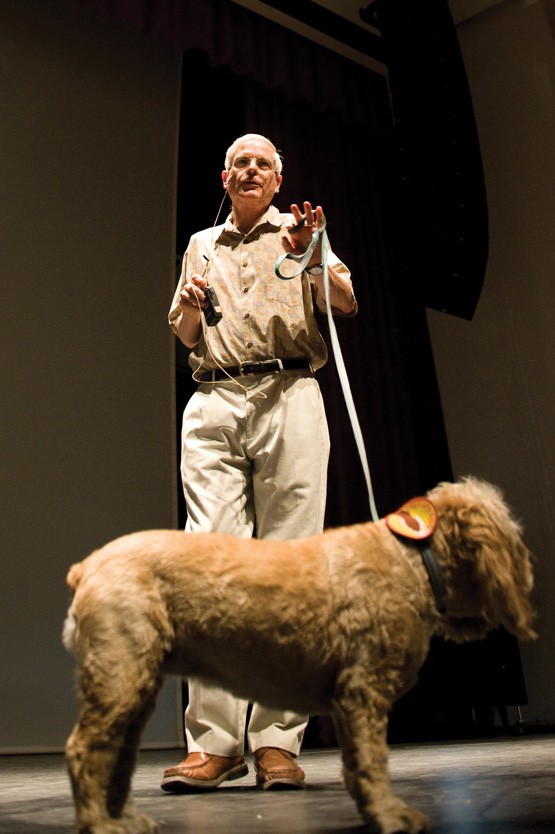David Soren stands on the stage and warns the audience that he might cry. He sits down, then rises and paces in front of a group of more than 1,000 people. His voice trembles as he begins to talk.
Years ago, Soren regularly took the stage as vaudevillian Little Howie Davis. But he is no longer a performer, and this is no show.
Now, he dances lightly, feet shuffling across the Centennial Hall stage. Soren is teaching students about Vera-Ellen, an American actress and dancer, in his Art History of the Cinema course. Tears form behind his glasses as he talks about the actress, whom he calls a “goddess.” The white-haired anthropology and classics professor, self-described as “old,” has no trouble expressing his emotions in the classroom.
Soren brings his childhood acting experience into the classroom, making him one of the most well-liked professors on campus. He has taught at the UA for a little more than 30 years.
“He’s one of the few professors that I’ve ever known that really wants to see undergraduates succeed,” says Taylor Genovese, an anthropology senior who accompanied Soren on an archaeological dig last summer. “He really trusts people, and I feel he embodies the spirit of education more than anyone else.”
Raised by a single mother in Philadelphia, Soren spent most of his time at the Germantown Boys Club while his mother worked full-time. At 8 years old, Soren was pushed around by older teenagers, and, when he was sexually assaulted, he found solace in the upstairs dance studio where Dorothy Wagner taught children to channel their creativity through song and dance. Soren quickly became the shining star of the dance studio.
But everyone was expected to be a professional, no matter what their age, Soren says.
“I didn’t have a childhood. There wasn’t close friends or playing,” Soren says. “Most of my playing was in front of audiences.”
The only break Soren got from being a professional was when he attended the children’s matinee on Saturday mornings. For a quarter a show, he would watch in awe as archaeologists discovered lost cities.
“I thought, ‘This would be great to do,’” Soren says, referring to archaeology.
Around 1957, Soren left vaudeville behind, and for a short time he struggled to choose between becoming an archaeologist and a musician. While pursuing his bachelor’s degree at Dartmouth, Soren played in a rock group known as The Sphinx, complete with groupies. Then he went on his first archaeological dig in England at the age of 20, and everything changed.
“On the excavation this girl walked into the room, and I said, ‘Well, that’s the girl I’m going to marry,” Soren says. “I just thought that this is who I wanted to marry and that was it for me.”
In England, he not only found the love of his life but also his calling — archaeology. His interest in
teaching, however, was no surprise. Soren says he gravitated toward the “wonderful” teachers he had while growing up, and he made the decision to follow in their footsteps.
Soren said he focuses on keeping students interested and connects with them through his course material.
“The main thing he’s able to do is bring down a very distant past and unapproachable subject, to some people, and he’s able to relate that to people’s lives very, very well,” says Matt Pihokker, a graduate student in the classics department and a former teacher’s assistant for Soren. “And he’s also a really good singer.”
Pihokker recalls Soren singing a Frank Sinatra song for the class on the very last day of the course.
This performance wouldn’t come as a shock to most students taking Soren’s classes, as Soren says he tries to entertain the class with a song, a clip or even a planned production every week.
“He’s very popular with students. He seems to have the right touch, so students love what he’s teaching,” says Norman Austin, UA interim head of the department of classics. “He brings many unusual qualities to the campus, and I don’t know anyone else who has that same attractive power for so many different people.”
When asked about the future Soren laughed and said the decision isn’t in his hands.
“Everyone keeps asking me when I’m retiring,” Soren says. “As long as it’s fun … I think the students will tell me when to hang it up.”









